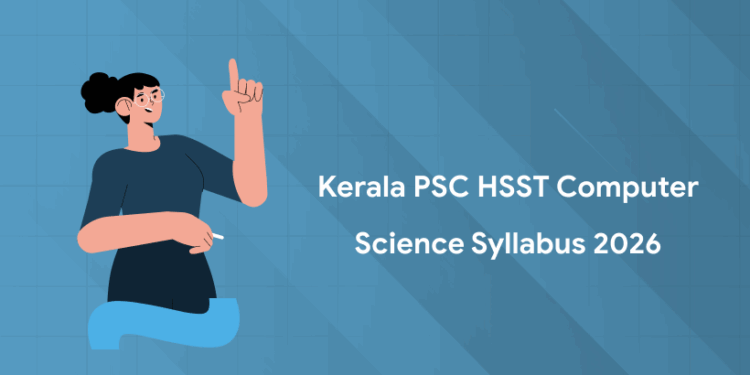Table of Contents
The Kerala PSC has released the HSST Computer Science Syllabus and Exam Pattern 2026. Candidates can now download the official syllabus and start their preparation. It covers key topics such as core computer science concepts, programming, networking, databases, and emerging technologies. The syllabus serves as a complete guide for effective exam preparation. Download Now!
Kerala PSC HSST CSE Recruitment 2026 Highlights
| Event | Details |
| Name of Exam | Higher Secondary School Teacher Junior (Computer Science) |
| Category Number | Notify Later |
| Conducted for | Educational Department |
| Exam Organizing Body | Kerala Public Service Commission (KPSC) |
| Level of Exam | State Level |
| Vacancy | Anticipated |
| Application Status | Open |
| Notification Release Date | Notify Later |
| HSST CS Exam Date | Notify Later |
| HSST CS Admit Card | Notify Later |
| Recruitment type | Direct (Statewide) |
| Mode of Exam | Online |
| Exam Duration | 1 Hours 30 Minutes |
| Official Website | keralapsc.gov.in |
Kerala PSC HSST Computer Science Syllabus & Exam Pattern 2026
1: The first recipient of the ‘Rajiv Gandhi Khel Ratna’ award?
The Kerala Public Service Commission has officially released the detailed syllabus and exam pattern for the HSST Computer Science examination 2026. Explore the latest syllabus by clicking on the provided tab below!
Enroll in Kerala's Top-rated HSA Coaching Program!
സർക്കാർ ജോലി എന്ന സ്വപ്നം ഇനി സ്വപ്നം മാത്രമല്ല! Join Entri's HSA Coaching Program
Join Now!Kerala PSC HSST Computer Science Previous Question Paper 2026 PDF
| Category Number | |
| 016/2018 | |
| 074/2015 | |
| 073/2015 |
Kerala PSC HSST Computer Science Exam Pattern 2026
Alongside the syllabus, the exam pattern provides insights into the structure and format of the HSST Computer Science exam 2026 including details on the exam topics, marking scheme, and duration of the examination.
| Module | Topics | Marks |
| Module 1 | Mathematics for CSE | 16 Marks |
| Module 2 | Computer Organization & Architecture | 16 Marks |
| Module 3 | Programming Languages & Database | 16 Marks |
| Module 4 | Theoretical Computer Science | 16 Marks |
| Module 5 | Operating Systems and Computer Networks | 16 Marks |
| – | Information Technology | 20 Marks |
| Total Marks | 100 | |
Kerala PSC HSST Computer Science Syllabus 2026: Detailed
Outlining the Kerala PSC HSST Computer Science Syllabus for 2026! This comprehensive guide outlines all the essential topics and subtopics you need to master for the upcoming examination. Go through the syllabus in detail here!
Part I
Module I : MATHEMATICS for CSE (16 Marks)
Linear Algebra: Matrices, Rank, system of linear equations, consistency, eigen values, eigen vectors, Cayley Hamilton theorem, diagonalisation, linear dependence and independence of vectors.
Basics of mathematical logic: Basic connectives and truth table, statements, logical connectives, tautology, contradiction. logical equivalence, principle of duality, implication, contrapositive, converse, inverse.
Counting Theory: Rule of sum, rule of product, permutations. combinations, binomial theorem, combination with repetition, Pigeon hole principle, principle of inclusion and exclusion.
Sets, Relations and Functions: Sets, relations, different types of relations, functions, different types of functions.
Algebraic Structures: Homomorphism, isomorphism, semi groups, monoids, groups, commutative groups, sub groups, Lengrange’s theorem, rings, fields.
Graph Theory: Graphs, subgraph, connectivity, independence sets, cliques, bipartite graphs, vertex cover, vertex colouring, planar graphs, graph representations.
Module II : Computer Organization & Architecture (16 Marks)
Digital Logic: Number representations and computer arithmetic (fixed and floating point), logic functions, minimization, design and synthesis of combinational and sequential circuits.
Computer Organization: Machine instructions and addressing modes, control design, memory interface, I/O interface, DMA, interrupts, pipelining, memory hierarchy – cache memory
Module III : Programming Languages & Database (16 Marks)
Programming in C: Data types, operators, type conversions, control statements, user defined functions, arrays, pointers, structure and union, file operations.
Object Oriented Programming Concepts: classes and objects, data abstraction, data hiding, data encapsulation, inheritance, polymorphism, abstract classes, interfaces, packages.
Programming Language Concepts: Parameter passing, binding, scope, recursion, imperative, declarative, functional and logic languages.
Databases: ER model, relational algebra, tuple calculus, database design, integrity constraints, normalization, SQL, transactions and concurrency control.
Module IV : Theoretical Computer Science (16 Marks)
Data Structures and Algorithms: Arrays, stacks, queues, linked lists, trees, binary search trees, binary heaps, graphs, searching and sorting algorithms.
Analysis and Design of Algorithms: Analysis – space and time complexity, Asymptotic Notations, Design strategies – divide-and-conquer, greedy, dynamic programming, branch and bound, complexity classes – P, NP, NP-hard, NP-complete.
Theory of Computation: Representation of regular languages -finite automata, regular expression, regular grammar, closure properties of regular languages, Existence of non regular languages, Representation of context-free languages – pushdown automata and context free grammar, closure properties of context free languages, Context sensitive languages, recursively enumerable and recursive languages, Turing machines, undecidability of Turing machines.
Language Translators: Compiler design, lexical analysis, parsing, syntax directed translation, code generation and optimization, assemblers, linkers and loaders, macroprocessors.
Module V : Operating Systems and Computer Networks (16 Marks)
Operating System: processes, threads, inter-process communication, synchronization, deadlocks, CPU scheduling, memory management and virtual memory, file systems, I/O systems, protection & security.
Computer Networks: ISO/OSI reference model, TCP/IP model, flow control, error control, IPV4 header format, IPV4 addressing, IPV6 header format, routing algorithms, congestion control, connection oriented and connectionless protocols in the transport layer, application layer protocols, network devices.
Part II
Information Technology (20 Marks)
Module I : Web Technologies (8 Marks)
Markup and Scripting Languages : HTML, Cascading Style Sheets, XML, Document Object Model, JavaScript, JSON, AJAX.
Web Servers : Sockets and ports, HTTP transactions, Web server, Proxy server, Domain Name Service, Client-side scripting versus server-side scripting, Multitier architecture.
Module II : IT Security (7 Marks)
Security – Basic Concepts : Risks and threats, Confidentiality, Integrity, Availability, Nonrepudiation, Passive and active attacks.
Cryptography : Symmetric key cryptography, 3DES, Public key cryptography, RSA, Secure Hash Algorithms.
Tools for security : Multi-factor authentication, Digital certificate, Digital signature, Firewall, Intrusion Detection System, Virtual Private Network, Kerberos.
Module III : Distributed Systems, Cloud Computing (5 Marks)
Distributed Systems : Architecture models, Inter-process communication, Remote method invocation, Clock synchronization, Web services.
Cloud Computing : Private and public clouds, Cloud service models (IaaS, SaaS, PaaS), Cloud access – authentication, authorization and accounting
Enroll in Kerala's Top-rated HSA Coaching Program!
സർക്കാർ ജോലി എന്ന സ്വപ്നം ഇനി സ്വപ്നം മാത്രമല്ല! Join Entri's HSA Coaching Program
Join Now!Kerala PSC HSST CSE Mock Exam 2026
| Mock Test Series | Link |
| Mock Series – 1 | |
| Mock Series – 2 | |
| Mock Series – 3 | |
| Mock Series – 4 | |
| Mock Series – 5 | |
| Mock Series – 6 |
Steps to Download Kerala PSC HSST Computer Science (CSE) Syllabus 2026
To download the Kerala PSC HSST Computer Science (CSE) syllabus, follow these steps:
- Visit the Official Website: Go to the official website of Kerala Public Service Commission (KPSC) @ www.keralapsc.gov.in.
- Navigate to Syllabus Section: Look for a section or tab labeled “Syllabus” or “Examinations” on the homepage or in the main menu.
- Search for HSST Computer Science Syllabus: Use the search or browse options to find the syllabus specifically for HSST Computer Science (CSE).
- Download the Syllabus PDF: Once you locate the HSST Computer Science syllabus, there should be a link to download it in PDF format. Click on the link to initiate the download.
- Save the File: The PDF file will download to your computer or device.













